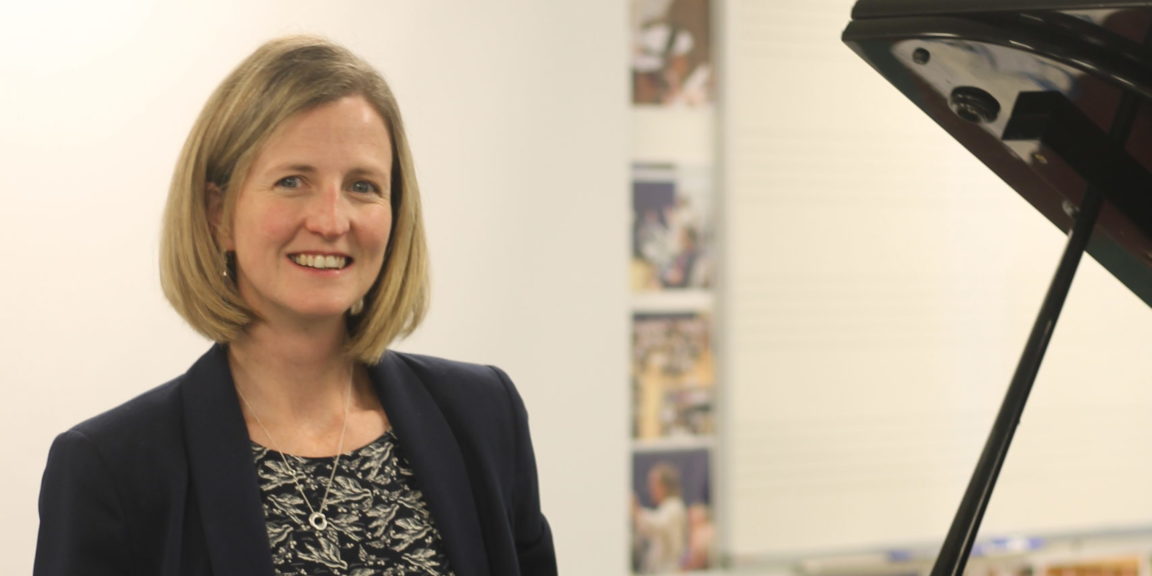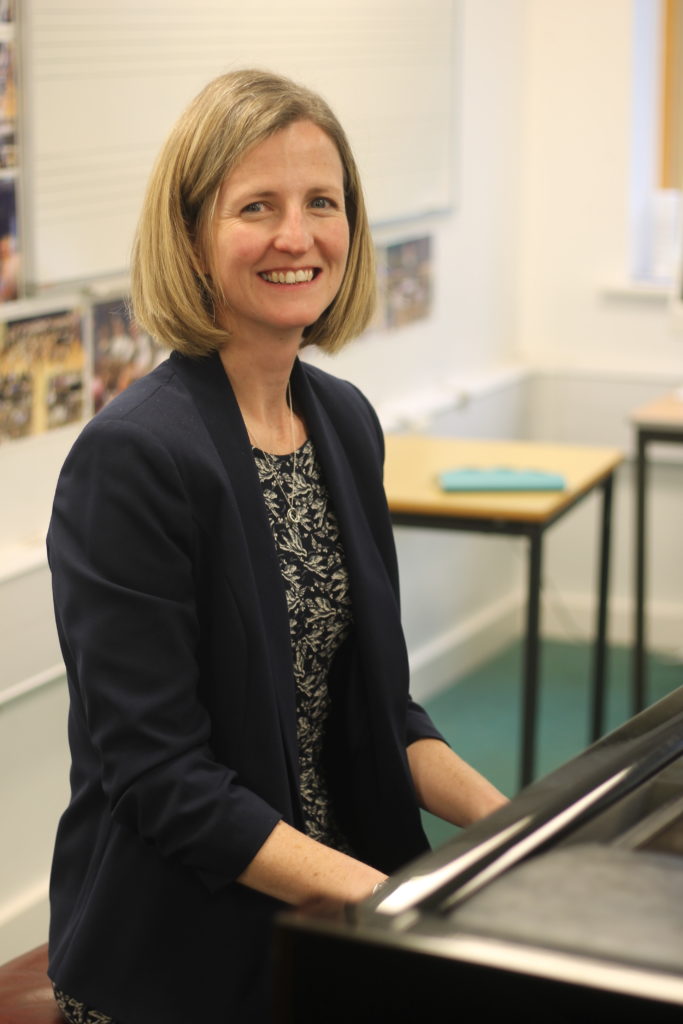
Introducing Mrs Amy Ward
Tormead’s new Director of Music
From April 2022, we welcome Mrs Amy Ward to Tormead; we sat down with her to discuss what she is looking forward to at Tormead, her musical background and how she hopes to develop the Music department.

Welcome to Tormead! We’re so pleased to welcome you to the school and get to know you more; can you tell us a little about your background and career history?
I was brought up in Birmingham and had some wonderful opportunities as there is such an incredible music scene in the city. I loved singing and sang with the City of Birmingham Symphony Youth Chorus from a young age. I read Music at York University and also completed my Masters at York, specialising in Music in the Community. However, the area that really inspired me was teaching. I undertook a graduate teaching programme where I was placed in a school and learnt on the job, before moving to Bristol where I worked in two schools and became Assistant Director of Music. My family relocated to Surrey for my husband’s job and I took a role at Surbiton High School, where I am currently the Assistant Director of Music, Academic.
Tell us more about your musical background.
From a young child, I had a real interest in choral music and have always sung in choirs whatever I’ve done. I sung semi-professionally with a brilliant group called Exultate Singers when I lived in Bristol and also led community choirs in the area – this is the element of music that really inspires me. However, whilst choral work is my passion, it is not the element of Music I formally studied. I’m a pianist and also play the clarinet – I even have an accordion at home! I’m the type of person that will pick up an instrument and think, “I’ll have a go on that!”. I’m currently learning Grade 1 Violin as part of a charity initiative and being taught by one of my students – I take my exam next term!
What are you most looking forward to at Tormead?
Everything! I’m really looking forward to working with the students and getting stuck in with the curriculum. I’m fascinated to see what they already do and think of ways to develop it, especially at GCSE and A Level. I’m also really looking forward to working with the ensembles that are already in place and finding new ways to involve more people. I have lots of ideas to increase participation such as a concerto competition for elite players and maybe lower down the school, learning a new instrument such as the ukulele could be fun! I want the girls to enjoy as much practical music making as possible in their lessons.
Is there an area of Music that you want to promote or introduce when you join Tormead?
Music is such an important part of life as music is everywhere! Therefore, music needs to touch the life of every person that goes through the school, and if it doesn’t, we haven’t done our job properly. Music has to be all-inclusive as, even if you don’t study or read Music, everybody is going to encounter music either at gigs, the theatre or at concerts and so being able to understand and appreciate it from a well-informed view point is essential. For example, at Surbiton High School, I introduced an instrumental programme so all Year 7 students learn to play either the flute or clarinet in their curriculum Music lessons for a term, which enables them to start developing their fundamental music skills.
For those students considering Music at GCSE and A Level, what advice do you have for them and what careers/opportunities can it lead to?
People with Music degrees end up doing loads of different jobs, not always music related. In terms of the music industry, it’s a really exciting time be joining the sector as so many jobs are opening up in music technology and the recording industry. Those with a Music degree could go on to be a performer or a teacher in various capacities such as within the community. One strand of music based careers that is really coming to the forefront is music and Dementia; music is such a stimulus and trigger for memories, and this, combined with the increased awareness of the disease, is enabling continual developments in this area. The opportunities from a musical education are so diverse and you gain so many transferrable skills that many people aren’t aware of. Music is mathematical in the way it is constructed and engineered and so you learn to be analytical – a skill that is useful in any career.
Do you have a favourite genre of music or a piece of music you love listening to?
I’m a massive fan of Benjamin Britten who is a 20th Century composer, especially Dawn from his Four Sea Interludes as it’s a beautiful piece of music about sunlight shining over the sea and opens the opera, Peter Grimes. I’m a big opera fan and love Wagner, especially the Ring Cycle, but really enjoy music from the 20th Century when music starts to break the rules. I also love Pink Floyd and prog-rock!
If you weren’t a teacher, what do you think you would be doing?
If I were to be reborn and do something that wasn’t music, I would say something like horticulture. I love watching things grow; I’m not a very good gardener but I’m inspired by that sort of thing, especially as in lockdown, we had to really appreciate everything outdoors a lot more. I love being outdoors so definitely something I where I could be outside.
Do you have any hobbies or interests, apart from Music, you like to partake in outside of work?
I love hiking and walking as well as running and doing some circuit training. I’ve got two young children so I love spending time with my family.
What is a current goal of yours?
I’m really looking forward to growing the Music department; I have so many ideas, I think I might need to rein them in!
Is there something in your career that you’re particularly proud of?
I stood up in front of 500 staff members at my last school and led a singing session in a staff briefing, so I’m quite proud of that!
What attracted you to coming to Tormead?
Tormead is a smaller school than my current school, so I believe it can offer a more personable education and pupil experience. As a teacher, I’ll get to really know the students and personalise what I offer them on an individual basis. To me, especially in Music where teachers invest so much into their students in terms of performing, composing, co-curricular and academic opportunities, I’ll be able to watch somebody grow as a person and musician. Enabling and inspiring young people to be the best version of themselves is what I’m really looking forward to and will be able to do at Tormead.
How do you hope to develop the Music Scholarship programme at Tormead?
Tormead welcomes students who excel in Music, and there are lots of opportunities for them to grow their performing and appraisal skills and be ambassadors for the Music Department. I’m really looking forward to growing the programme for Music Scholars when I join Tormead. I also really value students who show real drive, commitment, interest and passion in Music and would encourage these students to apply for a Music Scholarship, even if their performing skills are perhaps less accomplished. I love working with Music Scholars and see this as a two-way learning process – I learn lots from the students I work with, and I really enjoy sharing my passion and ideas in different areas of music-making with them.
Finally, what would you say to students who are considering studying Music at GCSE and A Level, but are concerned it is not seen as ‘academic’ enough?
I would argue that GCSE Music is not an easy option – there is a real academic element to it. You have to be able to analyse music critically, have a huge understanding of harmony and how composition works as well as being able to perform; many of these elements are very mathematical in the way they are constructed and set out. Music not only incorporates these elements, but also teaches so many transferrable skills such as confidence, being able to stand on stage and present yourself as well as collaborative working. Music is a really good all-round GCSE to take and incredibly ambitious as you have to create your own music, analyse other music and perform – all three of these areas complement each other but have their own skills set. It’s a great subject to study in preparation for university style learning and I would highly recommend it!


